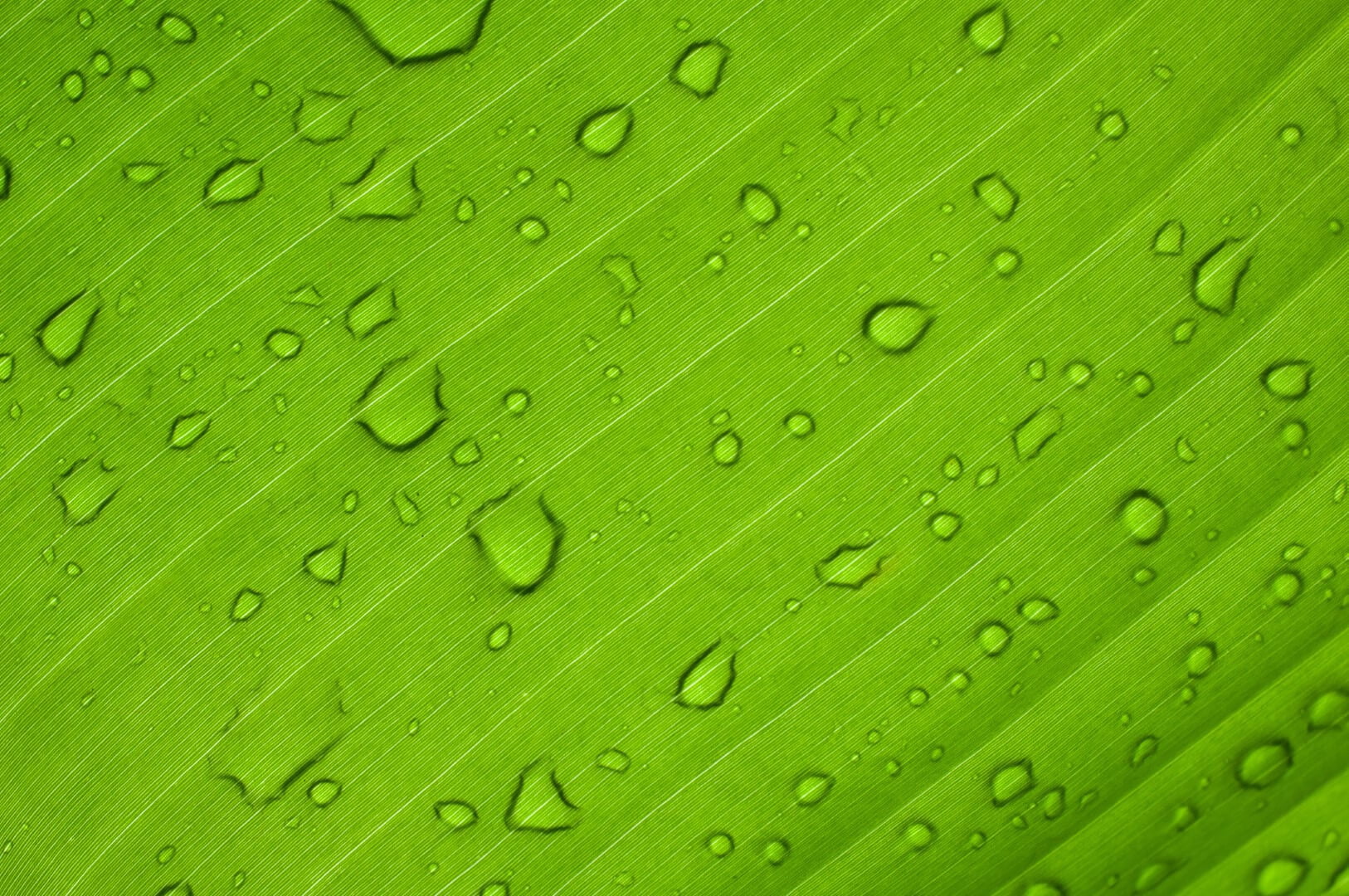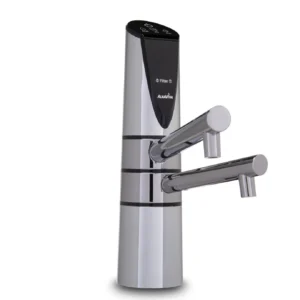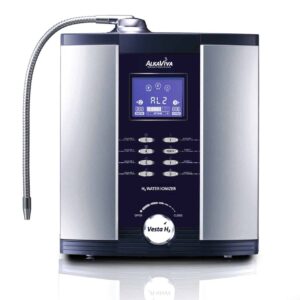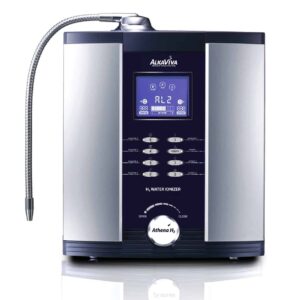Have you learned about the benefits of molecular hydrogen water therapy, but still have questions? I answered the most frequently asked questions below. If you have other questions, write them in a comment on this article and we will answer them.
Is hydrogen safe?
Yes. Hydrogen gas has been shown to be very safe in concentrations hundreds of times higher than those used in therapy. Here are some examples:
Hydrogen safety was first proven in the late 1800s, when hydrogen was used to locate gunshot wounds. Reports have shown that there are no toxic effects on even the most sensitive tissues.
Another good example of hydrogen safety is that hydrogen is used (in very high concentrations) in deep diving since 1943, to prevent decompression. Studies have shown that there are no toxic effects of hydrogen, even at high concentrations and pressures (98.87% H2 and 1.26% O2 at 19.1 atm.).
Moreover, hydrogen gas is a naturally occurring element in the body, because after a high-fiber meal, intestinal bacteria can produce liters of hydrogen daily. This is another benefit of eating fruits and vegetables.
In short, hydrogen is a normal element in our body, as opposed to a substance foreign to the body that can only be produced in the laboratory.
Is hydrogen dissolved in water the same as hydrogen gas in water?
The way hydrogen is found in water influences its stability and the speed with which it emerges from the water and dissipates in the air. Hydrogen can exist in water as:
- completely dissolved gas
- in colloidal or suspended form
- as macro-bubbles (large bubbles) of gas, which come out of the water almost immediately.
Important: it is not enough to introduce hydrogen gas into the water to obtain a therapeutic water. Hydrogen must be dissolved in water. If the hydrogen is only in the form of gas bubbles, it will come out of the water immediately and dissipate into the atmosphere, and the water you drink will have almost no hydrogen.
The lighter test
An excellent example of undissolved hydrogen can be seen in the so-called “lighter sample”, in which a flame is held close to the alkaline water outlet of a water ionizer. There is a sound like a squeak and small sparks can be seen as the hydrogen coming out of the water ignites.
The problem is that the hydrogen that ignites is just undissolved hydrogen in water, which evaporates immediately into the air, and therefore does not offer you any therapeutic value.
So the sound like a creak, like small crackles heard on the lighter test only shows that hydrogen was produced by electrolysis, but the amount dissolved in water may be below the therapeutic level.
“Milky water” and gas bubbles
Undissolved hydrogen can also sometimes be seen in some water ionizers when the water looks “milky” or “foggy” due to large bubbles of hydrogen gas. So, just because a water looks milky or just because you see a lot of bubbles in the water doesn’t mean that the water has a high concentration of molecular hydrogen. In fact, the concentration of dissolved molecular hydrogen may even be below the detectable or therapeutic level.
Water ionizers were designed decades before the importance of hydrogen was known. That is why they were designed to produce alkaline water and not dissolved hydrogen water. In fact, some ionizers can produce water with very high alkalinity, but without detectable amounts of hydrogen.
Other water ionizers can produce a good level of hydrogen when the electrodes and their pipes are clean, but after salt deposits appear inside them, the hydrogen concentration can fall below the detectable level. The duration until these deposits appear can be a few days, weeks or months, depending on the water source and how much the ionizer is used.
This emphasizes how important regular cleaning of the ionizer is, and the performance of its self-cleaning system. Each type of ionizer has a recommended period at which manual cleaning must be done. The more advanced the self-cleaning system of the ionizer, the less often it needs to be cleaned.
In conclusion, of all the molecular hydrogen produced by an ionizer, the only thing that matters to you is the amount of dissolved hydrogen. The higher the amount of dissolved hydrogen in relation to the total amount of hydrogen produced by the apparatus, the more efficient the apparatus is. Thus, if a system (water ionizer, hydrogen generator) were perfectly optimized, you should not see hydrogen bubbles in the water or hear sounds in the lighter test.
The presence of bubbles and sound in the lighter test does not mean that the water contains a high concentration of hydrogen. It also does not mean that the water does not contain hydrogen or contains a low concentration. These symptoms simply say nothing about how much hydrogen is dissolved in water, which is the only thing that matters to you.
How much hydrogen water do you need to drink to get health benefits?
This is the question that researchers are asking themselves and is still being investigated. Doses between 0.5 and 1.6 mg of hydrogen per day have been used in human and animal studies to date, and these doses have shown statistically significant benefits.
If your water has a hydrogen concentration of 1 ppm (equivalent to 1 mg / L), then two liters a day will give you a dose of 2 mg of hydrogen (H2). These doses are simply what has been shown to have effects in studies so far. For some people and for certain effective doses they may be higher or lower.
If we look at it from another point of view, we see that the waters of world-famous healing springs such as Nordenau (Germany), Lourdes (France), Tlacote (Mexico), Nadana (India), Hita Tenryosui, Japan, have hydrogen concentrations. molecular weight (H2) dissolved in water between 0.2 and 0.8 ppm. These concentrations and even higher concentrations can be obtained at home using a water ionizer or a hydrogen generator.
Does more hydrogen mean more benefits?
Maybe yes, maybe no … There is obviously a minimum amount of hydrogen needed to get health benefits. This amount may also vary from person to person.
It is important to know that you cannot have a problem because you have consumed too much hydrogen. It does not accumulate in the body, so you will simply exhale the hydrogen that your body does not need. In many cases a clear dependence of the effect on the dose size was observed, so the more hydrogen was administered the stronger the effects.
There are also unproven claims that a higher amount of hydrogen offers greater benefits. But more research is still needed in this area for a well-documented answer.
Is hydrogen gas not immediately lost from the water?
Yes, hydrogen starts to come out of the water immediately, but it doesn’t suddenly disappear from the water. Depending on the size of the water contact surface with the air, the degree of agitation of the water, etc., the hydrogen can stay in the water for a few hours or more before its concentration drops below the therapeutic level.
Hydrogen water is similar in behavior to carbon dioxide (CO2) carbonated water, which does not come out of the water when you open the bottle. Gradually, however, carbon dioxide comes out of the water and after a while the water is no longer carbonated, so it is better to drink the water before it becomes flat. Exactly the same happens with hydrogen water, which instead of dissolved carbon dioxide has dissolved hydrogen.
How long does molecular hydrogen (H2) remain in water?
Just like when you open a dose of acidic juice, as soon as the water with molecular hydrogen (H2) is left in the open air at normal atmospheric pressure, the hydrogen concentration decreases until it reaches equilibrium with the partial pressure of hydrogen in the atmosphere, which which means a concentration of H2 in water of 8.67 x 10-7 mg / L.
Because hydrogen is the smallest molecule in the universe, it is able to diffuse through all plastic containers and many other types of containers. Therefore, hydrogen has the highest effusion rate of all gases.
The rate of separation and dissipation of molecular hydrogen (H2) from water is directly proportional to temperature, liquid agitation, and air contact surface.
A 500 ml container of hydrogen peroxide, discovered, has a half-life of about 2 hours. In other words, if we leave the container with a water with a concentration of H2 of 1.6 mg / l, discovered in the open air, at room temperature, without stirring the water, the concentration of molecular hydrogen (H2) in the water will be approximately 0 , 8 mg / l after two hours. However, the dissipation rate is not exactly linear.
Is there a direct link between ORP and the concentration of molecular hydrogen (H2) in the water?
Important: Even if you have water with a high negative ORP, this does not mean that that water also has a large amount of dissolved hydrogen. You can have a water with an ORP of -700 mV that has more than 1 ppm of hydrogen or less than 0.05 ppm of hydrogen.
How much hydrogen can be dissolved in water?
The concentration of hydrogen gas (H2) is often reported in moles (moles / liter (M) or millimoles / liter mM), parts per million (ppm), parts per billion (ppb), or milligrams per liter (mg / l ). In dilute solutions, 1 ppm is approximately equal to 1 mg / l and therefore usually the two units are used interchangeably. The molar mass of hydrogen is about 2 mg / millimole, so a 1 mg is about 0.5 moles. Consequently, 1 ppm = 1 mg / l = 0.5 mM.
The concentration of hydrogen gas (H2) in ordinary water (from tap, bottled, filtered) is about 8.65 x 10-7 mg / L. In other words, there are less than 8 million milligrams of H2 in the water. Therefore, the molecular hydrogen (H2) in the normal filtered water has no therapeutic value. It’s just too little.
In the scientific literature, the concentration of 1.6 mg / l (1.6 ppm or 1600 ppb) is considered the “saturation” concentration, as this would be the concentration that would be reached in water if the atmosphere were composed only of hydrogen, and would have atmospheric pressure at sea level, which is 760 mm column of mercury (1.01 bar), ie 1 atmosphere (atm).
Other questions?
Do you have other questions about molecular hydrogen therapy that you would like to know the answer to? Write them in a comment below. And if you liked the article, please share it. Thank you.







